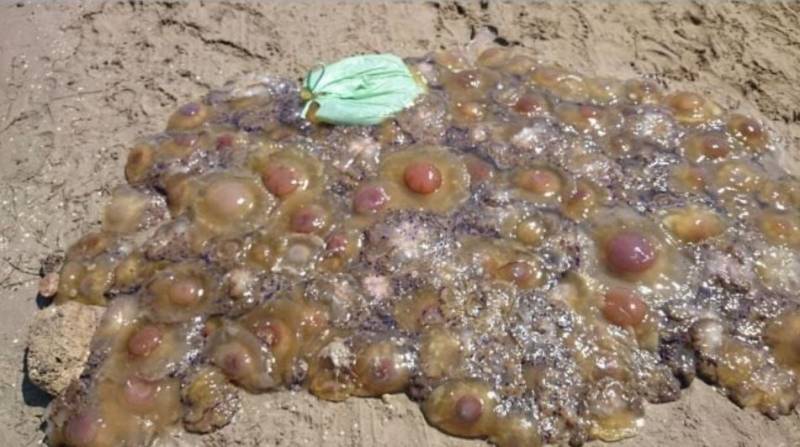- Region
- Vega baja
- Marina Alta
- Marina Baixa
- Alicante
- Baix Vinalopo
- Alto & Mitja Vinalopo
-
ALL TOWNS
- ALICANTE TOWNS
- Albatera
- Alfaz Del Pi
- Alicante City
- Alcoy
- Almoradi
- Benitatxell
- Bigastro
- Benferri
- Benidorm
- Calosa de Segura
- Calpe
- Catral
- Costa Blanca
- Cox
- Daya Vieja
- Denia
- Elche
- Elda
- Granja de Rocamora
- Guardamar del Segura
- Jacarilla
- Los Montesinos
- Orihuela
- Pedreguer
- Pilar de Horadada
- Playa Flamenca
- Quesada
- Rafal
- Redovan
- Rojales
- San Isidro
- Torrevieja
- Comunidad Valenciana
Date Published: 05/08/2024
Cartagena beaches invaded by thousands of jellyfish
Swarms of fried egg jellyfish made swimming at Los Urrutias and Punta Brava distinctly unappealing over the weekend

They might be perfectly harmless, but the appearance of thousands and thousands of slimy jellyfish along the Cartagena shorelines was enough to put most swimmers off on Sunday August 5. A strong easterly breeze drove the creatures inland and a huge number ended up nestled in the sand at Los Urrutias and Punta Brava.
Despite being slow to appear this summer, a few weeks ago the Mar Menor Scientific Committee predicted a sudden mass invasion of jellyfish along the coast. And on the first of this month, the authorities began erecting nets around San Pedro del Pinatar, specifically off the beaches of Playa de los Villananitos, Playa de la Mota and La Puntica, to keep the critters out at sea.
On Sunday, beach cleaners struggled to clear the Cartagena shores of the jellyfish and although the fried egg species is not dangerous to humans, the authorities still advised people to avoid swimming because of the sheer number of them. Contrary to popular belief, these jellyfish do actually sting, but their toxicity level is very low and any discomfort caused is usually short-lived and very mild.
Because they’re harmless, many beachgoers have a tendency to remove fried egg jellyfish from the water out of curiosity, but the Ministry of Ecological Transition has appealed to swimmers to let them be.
Fried egg jellyfish are an important part of the marine ecosystem. They play a vital role in the maritime food chain, as they are food for turtles, tuna, sharks and penguins, among others. They are one of the oldest organisms on our planet and there are records of jellyfish dating back more than 500 million years.
Image: SPCT/Archive
staff.inc.ali
Loading
Sign up for the Spanish News Today Editors Roundup Weekly Bulletin and get an email with all the week’s news straight to your inbox
Special offer: Subscribe now for 25% off (36.95 euros for 48 Bulletins)
OR
you can sign up to our FREE weekly roundup!
Read some of our recent bulletins:
Discount Special Offer subscription:
36.95€ for 48 Editor’s Weekly News Roundup bulletins!
Please CLICK THE BUTTON to subscribe.
(List price 3 months 12 Bulletins)
Read more stories from around Spain:
Contact Murcia Today: Editorial 000 000 000 /
Office 000 000 000



































